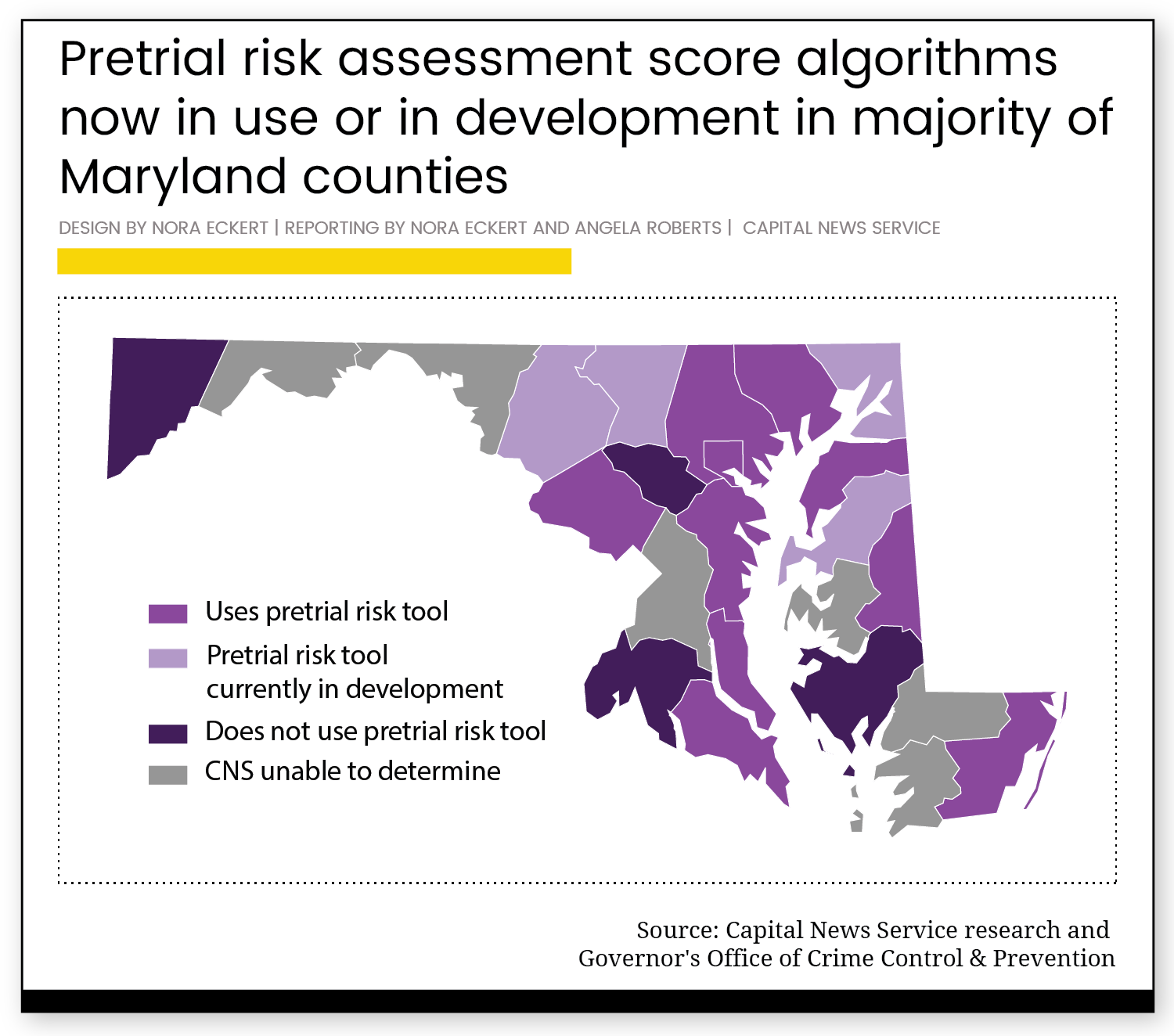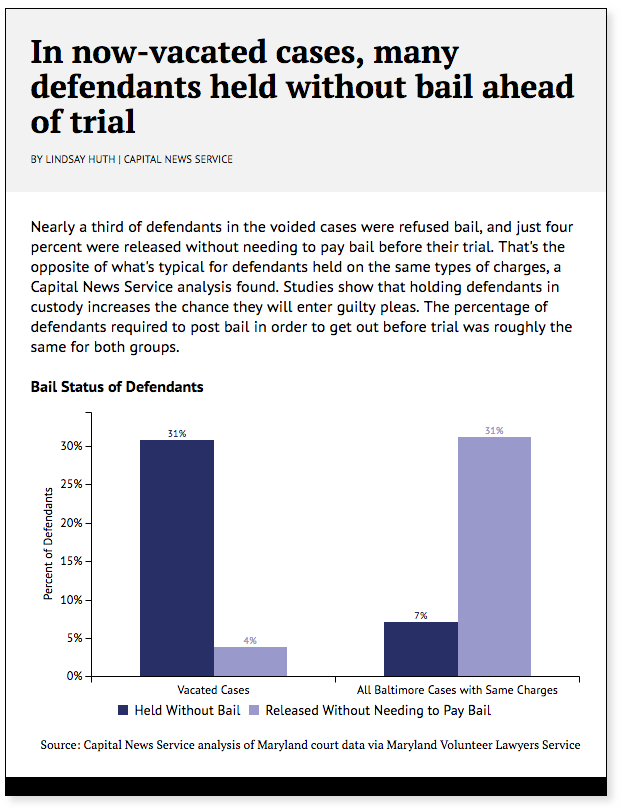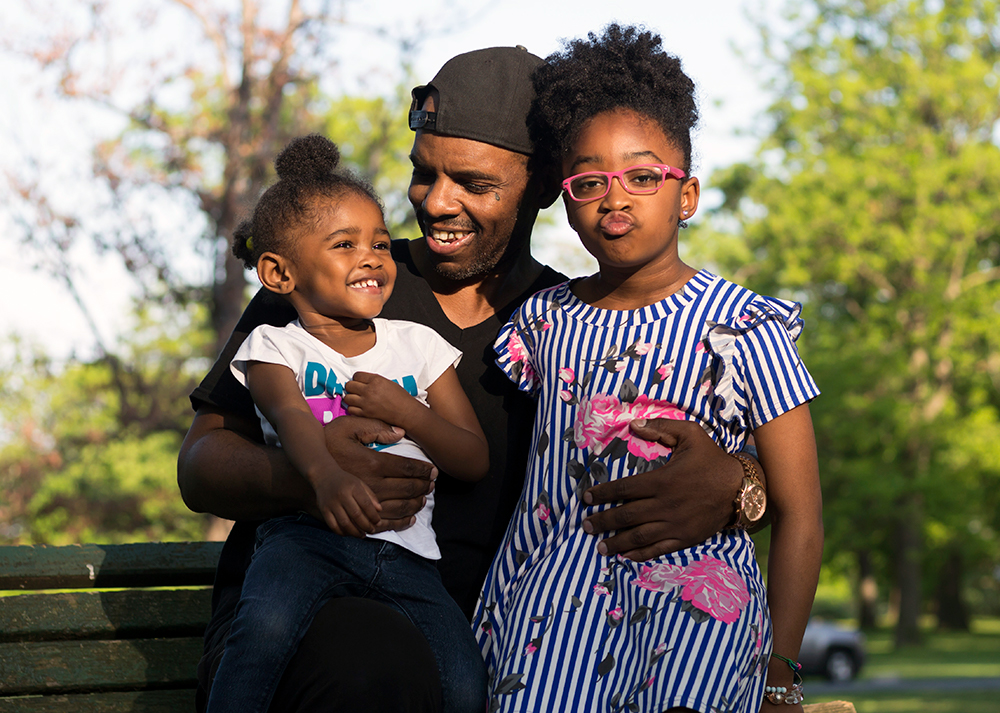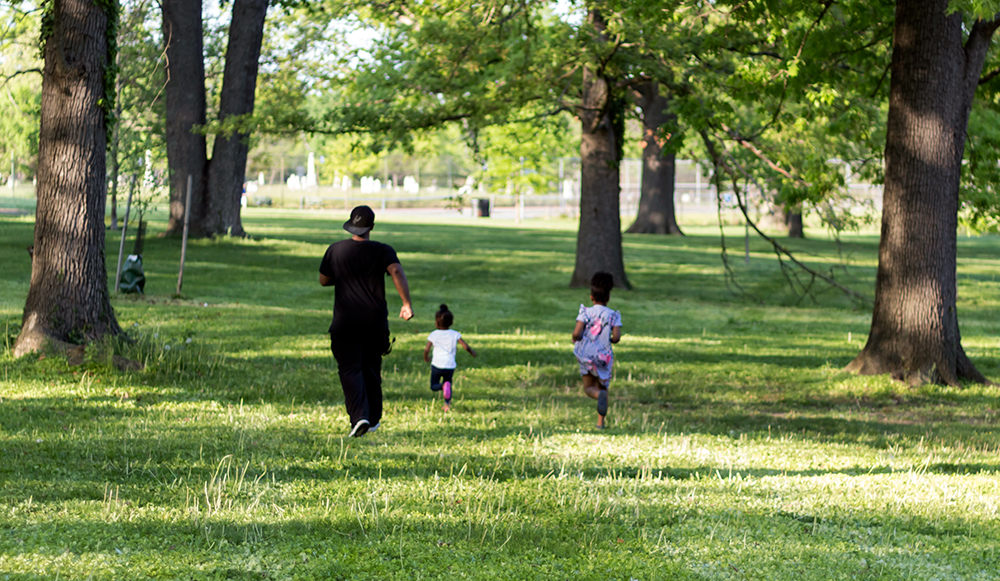BALTIMORE — Omar Burley and his cousin were parked in an old, black Acura on a residential side street in northwest Baltimore, when two cars pulled up next to them. Three men with guns jumped out.
Fearing a robbery, Burley hit the gas. His assailants gave chase.
“I was speeding for my life,” he recalled.
As he raced away, he crashed into a car carrying an elderly couple. The force of the impact pushed their vehicle into the porch of a house. The driver, Elbert Davis, died later that day. His wife suffered serious injuries.
The gunmen turned out to be Baltimore police officers. Their arrest report said Burley, then 39, had been parked in a “meet location for distribution of drugs” and fled when they displayed their badges. They wrote that they recovered 32 grams of heroin from his car after the crash. He was charged with manslaughter and possession with intent to distribute heroin, a felony.

Burley insisted they were lying. He said he had no clue the gunmen were police and he had no drugs in his car.
For more than a year, he fervently maintained his innocence while he waited in jail for trial — until the prosecutor offered him a plea deal and a warning.
Plead guilty and serve 15 years. If not, she would seek the maximum sentence if he lost at trial. With that amount of heroin, a prior drug conviction and the fatality, he was looking at 30 years or more in prison.
Burley pondered the odds a jury would believe him over the police.
“I’d never see the light of day,” he said. “Or I would be coming home a very old man.”
He pleaded guilty.
That was 2011.
While Burley sat in prison over the next six years, his girlfriend died, his father fell seriously ill, his daughter gave birth to his three grandchildren.
Not until 2017 did a federal investigation reveal that eight officers from the police department’s elite Gun Trace Task Force had for years been robbing people, planting guns and drugs on them and lying on arrest reports to cover up their crimes.
Most of their victims pleaded guilty. It turns out that many, including Burley, were not.
All eight have since been convicted. But they had a powerful accomplice yet to be held accountable: the criminal court system that convicted their victims.
An investigation by Capital News Service and Injustice Watch, as part of a nationwide examination of plea bargaining, found that Baltimore’s heavy reliance on plea deals and pre-trial detention led innocent defendants to plead guilty and enabled police corruption.
Over the years, repeated accounts by defendants of police abuse were hidden behind plea deals that, negotiated in private, assured neither the allegations nor evidence would get the public or legal scrutiny that occurs in a trial.
Baltimore City State’s Attorney Marilyn Mosby has acknowledged that thousands of cases may have been tainted because they hung heavily or solely on the word of the disgraced officers.
Her office is working with defense attorneys and judges to identify those cases, drop pending charges or — if too late — void the convictions. The final step, expungement, erases the case from the public record. But it can’t turn back the clock. Many defendants already served most or all of their sentences.
“I wasn't allowed to go to trial to bring out certain things that could've maybe prevented this,” said Burley.“Maybe the actions of those cops wouldn’t have continued to happen.”
He was among the first 105 defendants whose convictions had been voided as of mid-April. A CNS analysis of court data found that all but four involved guilty pleas. Nearly all, including Burley, were black men. More than half pleaded guilty while awaiting trial in jail, often for months.

Not all defendants were innocent. Rather, the state can no longer maintain their guilt. And because plea deals often occur before evidence-gathering for trial begins, the numbers of truly innocent defendants may never be known.
The analysis was based on a list of vacated cases that CNS obtained from the state’s attorney’s office, additional cases identified during court hearings and a court database maintained by the Maryland Volunteer Lawyers Service. Most involved gun or drug charges. In addition to the voided convictions, charges had been dropped in at least 48 pending cases.
“When you have a system where a very small percentage of cases are actually tried and subjected to the adversarial process, it is much less likely that this kind of [police] conduct is going to be detected and exposed,” said Michele Nethercott, director of the University of Baltimore’s Innocence Project Clinic. “Everyone can hide their mistakes.”
Such wholesale miscarriages of justice aren’t unique to Baltimore.
Just since 2010, police corruption scandals have led to more than 1,100 voided convictions in Philadelphia, 200 in Camden, New Jersey, and more than 20 in Chicago. All but a handful involved guilty pleas.
The wrongful conviction of people who plead guilty due to police misconduct “is a disturbingly common feature of the criminal justice system,” said Russell Covey, law professor at Georgia State University, in a 2013 study of mass exonerations.
In a common scenario, the charges are based almost exclusively on the police officer’s eye-witness testimony about finding drugs or guns on the suspect, he said. That’s a losing scenario at trial for a defendant. Guilty or innocent, the logical choice is a plea deal that offers less prison time.
Yet the public perception is that people don’t plead guilty unless they are. Even the innocence projects, which specialize in exonerating wrongfully convicted defendants, rarely accept guilty plea cases. They are exceedingly difficult to win.
About 94 percent of criminal convictions in state courts nationwide are the result of guilty pleas, according to data compiled by the federal Bureau of Justice Statistics. In federal courts, guilty pleas make up 97 percent of all convictions.
If only a small share of those are innocent, Covey argues, their numbers are significant.
Many guilty pleas are the result of plea bargaining. Done right, plea deals provide quicker resolution for guilty defendants and relieve overburdened courtrooms of costly, time-consuming trials. In typical cases, prosecutors induce defendants to admit guilt in exchange for dropping the most serious charges or reducing the sentence far below what it might be if they go to trial and lose.
But the choice frequently is based on a flawed foundation, Nethercott argues — that the police officer’s account of what happened is true.
“The police report describes the witness said this, the witness said that, this is what the scene looked like. No one is testing the veracity of that,” she said. “We’re adjudicating on basis of police reports...That’s completely at odds with an adversarial system where you test the evidence through questioning on the witness stand.”
Michael Schatzow, chief deputy state’s attorney, said cases that rely on police are getting stepped up scrutiny in his office. Prosecutors have been instructed to check internal affairs files of arresting officers to assess their credibility and to share the records with defense attorneys, he said.
“I think we are asking more questions now,” he said. “We are making sure more questions are asked in each case.”
Sgt. Wayne Jenkins’ name appears as an arresting officer on 82 of the voided Baltimore cases, the CNS analysis found. He became the sixth member of the Gun Trace Task Force to plead guilty over the past year and faces a sentence of 20 to 30 years in prison.
The task force was created a decade ago to crack down on illegal firearms. Jenkins joined the unit in 2016 as officer-in-charge. But he began operating outside the law long before.
Hired in 2003, he rose to detective and later to sergeant, and supervised a unit that targeted violent offenders, gangs and gun crimes for nearly three years.
The litany of crimes he committed date back at least eight years and take up 12 pages in his plea agreement. He admitted to stealing hundreds of thousands of dollars in cash, drugs and property and submitting false police reports and phony overtime hours.
His admissions include a 2016 traffic stop, in which he and three other officers obtained the driver’s address from his license, confiscated his house key and went to his home, where they stole $200,000, a $4,000 watch and two kilograms of cocaine. He broke into another home and stole seven luxury watches worth more than $170,000.
Some robberies seemed penny-ante in comparison. He and two other officers stole $1,500 to $2,000 from a taxicab. Following the death of Freddie Gray, who was fatally injured while in police custody in 2015, he confronted someone looting a pharmacy — and stole the prescription drugs in their possession to sell on the black market.
Jenkins' 2010 encounter with Burley and Brent Matthews, then 36, was among his earliest confessed crimes.
After the crash, Jenkins arranged for the heroin to be placed in Burley’s car, then he wrote the statement of probable cause used to charge the two men with felony distribution.

After taking the two men into custody, Jenkins listened to recordings of their calls from jail as they told loved ones that the heroin had been planted. He relayed his concerns to another officer who had been at the scene. Jenkins said he could not testify if the case went to trial because “something had been put in the car.”
He did not have to worry.
In Baltimore, the first stop for defendants after booking is Baltimore City District Court for a decision on whether they should be released or held pending trial. Some are released with a court date. Others are held unless they can post bail — insurance they will show up for trial. Those deemed too great a risk are held without bail.

Unlike most major cities, Baltimore police officers usually make the initial decision on whether and what to charge the people they arrest, not prosecutors — and in doing so wield tremendous influence over the bail decision.
Studies have found that those in custody are much more likely to plead guilty. For example, a large study in 2016 for the National Bureau of Economic Research found that 43 percent of detained defendants pleaded guilty compared to just 21 percent of those released. Those behind bars have a weaker bargaining position.
The CNS analysis of the voided convictions found that 97 percent of the defendants were held in custody after their arrest. At the time they pleaded guilty, 57 percent were still in jail. Thirty-two people had been held without bail. Twenty-five had not been able to make bail.

Douglas Colbert, a professor at the University of Maryland law school who works on bail reform issues, said the analysis “reveals alarming data...It's almost like a reversal of what should be taking place.”
Last year, a new state court rule required judges to set bail so it is more affordable for low-income defendants, and to release them without bail if they are not a risk. The early results show a drop in people held on bail but a rise in those held without bail.
A court officer called a commissioner makes the initial decision on whether to hold or release someone. Those held in custody then get a bail review hearing before a district court judge. The hearings are done remotely. Prisoners assemble at the jail in front of a camera that transmits to a television screen in the courtroom.
The judge is supposed to consider a variety of factors, such as employment, ties to the community and prior convictions. But the seriousness of charges and underlying facts weigh most heavily, Colbert said. CNS reporters found that defendants who try to challenge the police version of events during the bail review hearing often are told to save those arguments for trial — an opportunity most will not have.
“For the purposes of this hearing, many judges accept those allegations as true,” Colbert said. “In my opinion, they should not be doing that. Particularly now that we see that eight convicted officers repeatedly lied under oath when they presented charges to a commissioner or a judge.”
Barbara Baer Waxman, the Baltimore City District Court administrative judge, declined to be interviewed for this article as did Charles J. Peters, judge-in-charge of the criminal division of Baltimore City Circuit Court.
Burley and Matthews were held without bail on the heroin charge in April 2010, and prosecutors added a manslaughter charge against Burley for Davis’ death.Their cases were sent to the Baltimore City Circuit Court, which handles serious felonies.
In February 2011, the heroin case moved into federal court, where Christine Celeste, a Baltimore City assistant state’s attorney on special assignment to federal court, took over prosecution.
The maneuver puts greater pressure on defendants to plead guilty, said James Johnston, an assistant public defender who represented Burley in Baltimore City court. They face the possibility of longer prison terms — and less sympathetic jurors — in federal court if they lose at trial.
Johnston, who is president of the Maryland Criminal Defense Attorneys Association, said federal jurors are drawn from a larger area that includes suburban and rural areas “who are seen by defense lawyers and prosecutors as substantially more likely to convict than Baltimore City jurors.
“That’s particularly true when the case comes down to a credibility battle between a police officer and a defendant in a criminal case,” he said.
Matthews, who faced a potential 20-year prison term, pleaded guilty in exchange for a four-year sentence with credit for time served. He did not respond to requests for an interview.
The stakes were higher for Burley. If he didn’t plead guilty and lost at trial, he said, the government would press the judge to increase his sentence for reckless endangerment, increase it further for causing a death and increase it yet again because he had a prior drug conviction. Instead of 15 years for a guilty plea, he could get 30 years or more, plus a potential $1 million fine.
“The stakes were too high,” he said. “So I folded.”
Burley said he still hoped to go to trial on the manslaughter charge, which remained in state court. He wanted to put on an official record somewhere the truth of what happened, he said. But he said he was told that would jeopardize the federal plea deal. He pleaded guilty to both in exchange for a 15-year term on the drug charge and a concurrent 10-year sentence on manslaughter.
Celeste and Thomas Crowe, Burley’s federally appointed lawyer, declined to be interviewed.
“I knew I didn't have no drugs, and I knew that I was running for my dear life. So I thought that should be known in court,” said Burley. “But it never seen the light of day.”
Burley and Matthews went to prison. Jenkins continued his crime spree.
Anthony Branch crossed paths with him in 2014. Branch, then 20, was hanging out in front of a friend’s house when officers piled out of an unmarked car, Jenkins among them. Branch said they ordered the group to sit down on a nearby curb.
After searches of Branch and his friends yielded nothing, the officers arrested Branch. He said he asked but the officers never gave him a reason. He learned at central booking he was being charged for illegal possession of a firearm that he says he had never seen. The police report was signed by Det. Evodio Hendrix, later convicted in the Gun Trace Task Force scandal.
Branch said the commissioner set his bail at $250,000. At his bail review hearing, neither he nor his public defender were given a chance to challenge the police version of events, he said. The judge ordered Branch held without bail.
Five months passed. As Christmas approached, an assistant state’s attorney offered him a deal: If he pleaded guilty, he could get four years’ probation and return to his family that day. If he went to trial, he risked the maximum penalty of five years’ incarceration.
Branch lives with his older sister and his grandmother, who has diabetes. He said he worried about the stress his detention caused them, and about the extra household chores they had to shoulder. “It affected them in a lot of ways,” he said.
He felt stuck “between a rock and a hardship,” Branch said. “Because it was like, am I going to just plead guilty to something I didn't do to get back to my family, or should I just… take it to trial and risk losing everything?”
He said he told his lawyers that he didn’t commit the crime. They believed him, he said, but “they were like ‘Man, at the end of the day, even if you didn't do what they said you're doing, how could you prove that?’”
Branch had previous misdemeanor convictions for drug possession and gambling. What did a 20-year-old like him have against the police, he recalled thinking. And, if he took the deal, he would be home by Christmas.
“I pleaded guilty, so I could get back to my family.”
The conviction would come back to haunt him.
In May 2017, Branch was a passenger in a car that police pulled over. After they found drugs and a gun in the vehicle, they charged him with violating his probation and slapped him with a new charge. His previous gun conviction added time to his sentence. He spent another nine months in jail before being transferred to a halfway house in February. In April, the court voided his original case. He was scheduled to be released from the halfway house at the end of May.
Evidence of corruption by Jenkins and others lay just below the surface in Baltimore’s criminal justice system for years. Defendants’ allegations rarely made it to open court, leaving the isolated few that did to founder.
Internal affairs complaints against police officers piled up in secret. Under Maryland law, they are not public records. Defense attorneys had to get a court order to access them.
“Limited access to officers’ internal affairs files inhibits defense attorneys from advising their clients on whether or not they should take a plea deal or go to trial,” said Debbie Katz Levi, director of special litigation in the Maryland Office of the Public Defender.

“If I had a Jenkins case and I knew that he was alleged to have robbed six people while working as an officer…I would have never advised my client to accept a plea,” she said.
Meanwhile, the state’s attorney’s office had full access to the complaints and an obligation to check out a police officer’s records before going forward with a case, she said, especially given the department’s recent track record.
Prior to the Gun Trace Task Force indictments last year, the federal court authorized a consent decree requiring police to address long-standing patterns of racial profiling and excessive force.
Schatzow, the chief deputy state’s attorney, said his office was legally obligated to provide defense attorneys with internal affairs records only if they had a bearing on the defendant’s guilt or innocence, sentencing or impeachment of witnesses. However, he said his office will provide full access to the files going forward.
“It’s not required by law. It involves an awful lot of resources. We didn’t do it because we weren’t required to do it,” he said. “What’s changed is Freddie Gray died while in police custody...A federal judge has issued a consent decree. Members of the Gun Trace Task Force have been indicted.”
Jenkins’ lawyer, Steve Levin, declined to comment but referred reporters to a sentencing memorandum in which he says his client “understands the gravity of this situation and his culpability.”
Burley said he learned about Jenkins’ arrest in March 2017 in the rec hall of an Oklahoma prison, where he stayed for a few days in federal transit. News about the Gun Trace Task Force flashed across the television screen.
“I wasn’t even watching the TV, and they say, ‘Little Baltimore, Little Baltimore, did you see that?’” he recounted.
Matthews, who already had served his time, shot Burley an email about 10 minutes later: “They finally got them bastards, man.”
Encouraged by his cellmate, Burley wrote a letter to U.S. District Court Judge Catherine Blake. She had dismissed a gun charge against him in 2009 after the U.S attorney’s office determined that the gun wasn’t his. As with the later drug charge, Baltimore police had arrested him and the case moved to federal court.
“Could you imagine how hard it is to be here for a crime I didn’t commit and struggling to find clarity and justice on my own?” he wrote the judge from prison.
Last August, seven years and four months after his arrest, Burley walked free.
On a recent afternoon, he chased two of his granddaughters around a playground at Druid Hill Park in Baltimore. When he sat down on a bench, Arian, now 3, climbed onto his lap and Aubrey, 7, leaned against him.

Burley, now 47, said he missed so much in prison — his older daughter becoming a mother, his younger daughter’s junior prom, his granddaughters growing up.
“When you become a parent, you want to be a part of those things,” he said.
He would talk to the 7-year-old occasionally by phone “and I couldn't talk to her long because she had so many questions like, ‘Granddaddy, why do I never see you? Or where you at?’ They told her I was away in school.”
He is still paying a price. While he was in prison, relatives of Elbert Davis, the man killed in the collision, sued Burley and won a $1 million judgment against him. His exoneration did not wipe out that debt, he said. Members of the Davis family now are suing the city’s police department and mayor.
He doesn’t have a job yet and worries that his conviction and the publicity surrounding it will scare off employers when they look him up on the internet.
“Why me? You know what I mean? For what reason?” he said. “Why would they [the police] want to destroy my life for no apparent reason at all? I never, they don't know me, I don't know them.”
He wonders if he made a mistake by pleading guilty.
“Well, somehow I wish that maybe I would've just stuck with my first intuition and went on and not pleaded guilty. Took it to trial. But I was afraid,” he said. “They put that time in front of you and you know the judicial system. And you've been through it before and how easy it is for you to get time, or get found guilty...So you want as less as time as possible.You know what I mean? And that's what it was.”
Burley and Matthews were exonerated in a hearing last December before U.S. District Judge Richard D. Bennett, who had accepted their pleas in 2011. After voiding their convictions, he stepped down from his bench to shake the men’s hands and offer them a personal apology — the third time in a 14-year-long career for him to do so, he said.
“Somebody in a position of authority. . . has to apologize on the behalf of the government,” Bennett told the men. “I’m very sorry.”
Four months later, a Baltimore City Circuit Court judge cleared Burley’s manslaughter conviction.
Burley said he felt mixed emotions.
“I was happy and stuff but I still was thinking about, you know, I felt like I was lucky,” he said. “I still was thinking about all the other people that has put in my situation that's been forced to plead out the cases, that wasn't actually guilty.”




